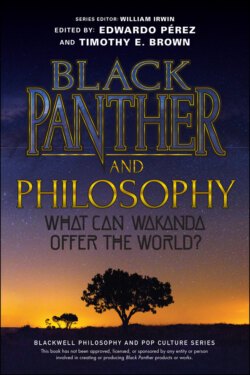Читать книгу Black Panther and Philosophy - Группа авторов - Страница 11
“Don’t Scare Me Like That, Colonizer!”
ОглавлениеAt first it might seem a bit dubious to think that Edmund Burke can have anything to say about Wakandan politics. After all, Burke was a member of the British Parliament at a time when European nations had colonized much of Africa. And perhaps more than anything, Wakanda was created as a way of mythologizing what Africa might have been like if colonialism hadn’t happened. But Burke was a much more complicated man than our modern understanding of colonialism would lead us to believe. In fact, Burke spent a great deal of his career criticizing British colonial practices in India and America. Moreover, his ideas about politics and revolutions can easily lend themselves to a critical view of colonialism as a project, and no doubt T’Challa would find Burke to be a potent and persuasive ally in resisting attempted revolutions in Wakanda.
Like the people of Wakanda, Burke lived in a world of contradictions and tension between diverse people. Born in Dublin to a Catholic mother and Protestant father, Burke learned from an early age that an immensely complex system of conventions, arrangements, agreements, customs, and compromises makes it possible for different kinds of people to live together in a harmonious social order. For him, it was a miracle that the British nation had found a way for its diverse people to coexist in a stable and free society.
During his time in Parliament, Burke devoted himself to reforming the country that he loved. Throughout his career, he helped to reform criminal and financial law, opposed laws restricting religious dissenters, supported William Wilberforce’s efforts to end slavery, and worked to improve other aspects of the British government.
But today Burke is probably best known for his opposition to the French Revolution – a position that surprised a lot of people. Most of Burke’s contemporaries had expected the staunch Whig reformer to support the French in their efforts to liberalize their nation. Why wouldn’t Burke welcome what many considered to be a great reform of an antiquated and unjust system in France? His position made some of his contemporaries disparage him as a man who just wanted to preserve the past for its own sake (apparently, being a tireless reformer is a thankless job!).
The reason for Burke’s opposition to revolution lies in how he thought that societies ought to grow and change. His early life had shown him that the bonds that hold societies together are far too complex for human reason to fully understand, so it is both foolish and immoral for anyone to think that reason alone can determine the form of government. Even if we have the best of intentions, we will cause unforeseen consequences when we use pure reason in order to change society and ignore traditions that have built up over a long time. As Burke writes, “Men little think how immorally they act in rashly meddling with what they do not understand. Their delusive good intention is no sort of excuse for their presumption. They who truly mean well must be fearful of acting ill.”1 In other words, pure motives, good intentions, and clear reasoning do not justify us in carrying out revolutions.
And it doesn’t matter how intelligent the revolutionaries or their plans are. Even if we gathered together Reed Richards, Tony Stark, and Bruce Banner (three of the smartest people outside Wakanda) and asked them to carry out a revolution that set up a new, rationally based government in Wakanda, the result would be disastrous – and not only because the three of them are unlikely to agree about what the best society would be! Burke would say that not even three of the smartest people on earth could rationally design a system that would satisfy everyone. (Chances are, it would only satisfy people who already think like Reed, Tony, and Bruce.)
Instead of revolution – which tears down society as it is and erects something entirely new in its place – Burke preferred gradual, organic change that builds upon the parts of a society that already work well. “By preserving the method of nature in the conduct of the state,” he writes, “in what we improve we are never wholly new; in what we retain we are never wholly obsolete.”2 By following the example of nature, which always builds upon the world as it is rather than starting over with something brand new, we conserve what works in a society while also allowing for change that will be beneficial. This is the model of change that Burke thinks will truly improve societies.
So, if reason alone can’t show us how to govern or to change society, we must let the specific traditions and customs of our society help to guide us in ordering it. And reason can’t create a one-size-fits-all model of government for nations with different traditions (say, Wakanda, Attilan, and Latveria, for example). In a speech supporting American independence (a cause which Burke didn’t regard as a revolution since the Americans had spent centuries developing their own culture and society and just wanted to be left alone), Burke argued that a government must take into account the sentiments and character of its people in deciding how to govern them. Britain’s way of governing itself isn’t necessarily the right way to govern the American colonies. And, as he says in Observations on the Late State of the Nation, “Politics ought to be adjusted not to human reasonings but to human nature, of which reason is but a part and by no means the greatest part.”3 In other words, a politics of reason alone attends to only one part of human nature, and such a politics will go wrong by ignoring people’s sentiments, traditions, and customs.
